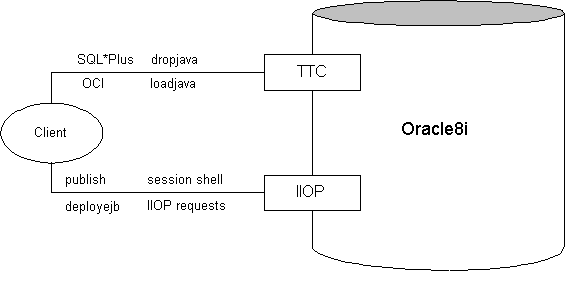Release 8.1.5
A64683-01
Library |
Product |
Contents |
Index |
| Oracle8i Enterprise JavaBeans and CORBA Developer's Guide Release 8.1.5 A64683-01 |
|
In networking terms the presentation layer is responsible for making sure that data is represented in a format that the application and session layers can accommodate. In Oracle presentation can refer to a service protocol that accepts incoming network requests, and activates routines in the database kernel layer or in the Java VM to handle the requests.
In earlier versions of the Oracle database server there was a single service--the two-task common (TTC) layer. This is the service that handles incoming Net8 requests for database SQL services from Oracle tools (such as SQL*Plus), and customer-written applications (using Forms, Pro*C, or the OCI).
In addition to TTC support, Oracle8i JServer supplies two IIOP services:
oracle.aurora.server.sGiopServer
oracle.aurora.server.GiopServer
These services handle TCP/IP requests that are routed to the service entrypoint by the listener and dispatcher. These IIOP services are capable of starting, controlling, and terminating Oracle8i database sessions, in the same way that an incoming TTC request from a tool such as SQL*Plus is capable of starting and terminating a database session.
When using the Oracle8i JServer tools, especially when doing EJB and CORBA development, it is very important to distinguish the two service types: TTC and IIOP.
Tools such as publish, deployejb, and the session shell access CORBA objects, and so must connect using an IIOP port. Also, EJB and CORBA clients, or distributed objects acting in a client role, must use an IIOP port when sending requests to Oracle.
On the other hand, tools such as loadjava and dropjava connect using a TTC port.

Figure 4-1 shows which tools and requests use TTC and which use IIOP database ports. 1521 is the default port number for TTC, and 2481 is the default for IIOP.
The two IIOP services differ in only one major respect: the session IIOP service embeds a session identifier in object references. This allows a single client to access multiple sessions, which would be impossible if there were no concept of a session identifier in object references.
The session IIOP service uses the foundation provided by the Oracle8i multi-threaded server to provide very high application scalability. See the Oracle8i Java Developer's Guide for introductory information about application design and scalability. Both the session and the plain IIOP protocols are discussed in greater detail in "About the Session IIOP Protocol".
|
Note: This guide does not discuss configuring the database server to handle incoming IIOP requests. See the Net8 Administrator's Guide for listener and dispatcher configuration information. |